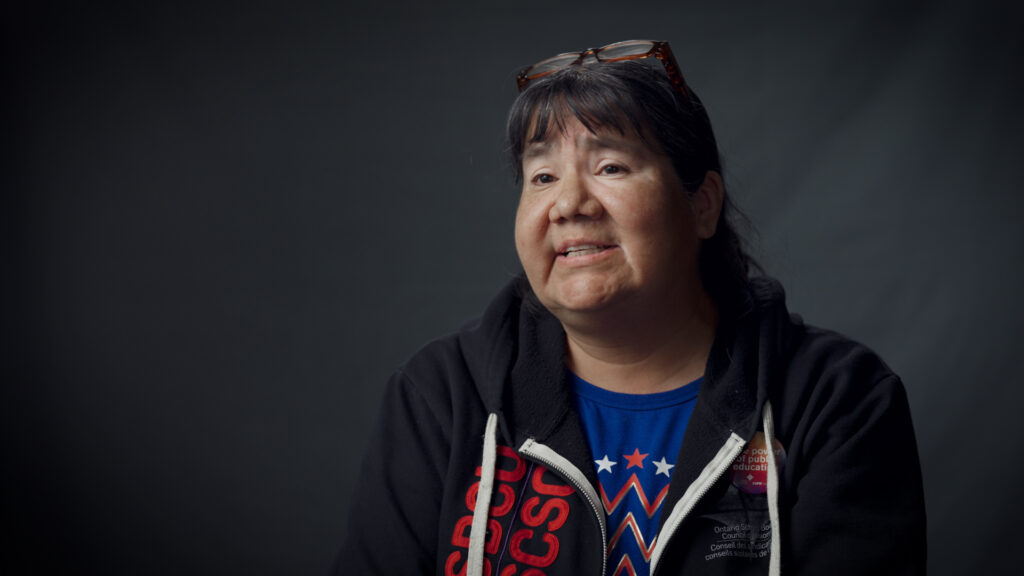- Place an order, or for other inquiries:
- 416-923-3567 ext. 3325
- content@newsmediacanada.ca
$39,000 is not enough, for education workers or anyone

TORONTO, ON –/COMMUNITYWIRE/– As most students prepare to go back to school next week and with pressure on parents to spend even more out of their own pockets on everything from school supplies to the skyrocketing costs of food and rent, Ontario’s 55,000 frontline education workers are using bargaining for their next collective agreement to secure more resources for students, families, and each other.
Education workers’ proposals for Student Success and Good Jobs include a reasonable, necessary, and affordable wage increase of $3.25 per hour that will help retain and recruit workers to give children what they need in the classroom and pull workers back from the brink of poverty.
Listen to education workers’ new radio advertisement and watch videos of frontline workers in their own words on 39000isnotenough.ca.
Quotes:
“Today, students have no service guarantees,” said Laura Walton, educational assistant and president of CUPE’s Ontario School Boards Council of Unions (OSBCU). “Tomorrow, education workers will have nothing to prevent their wages from being devalued again and school boards will still have problems keeping and finding employees due to low pay. That’s why we’re calling on Stephen Lecce and Doug Ford to rescind their insulting offer, pay workers a decent wage, and invest in more staff to provide the services students rely on.”
“What students and workers need is two sides of the same coin,” said Walton. “Our work is crucial to children thriving. If we’re paid enough to keep up with the huge inflation that everyone’s facing, we could afford to put our own kids in sports, it would be easier for school boards to keep staff from quitting, and we wouldn’t have to personally make up for a decade of government funding cuts by working second jobs.”
“It’s within Doug Ford’s power to direct his negotiators to hammer out a deal that puts students and workers first right now, just as it was 89 days ago when we served notice to bargain on the day after the provincial election,” Walton noted.
“I work with high-needs students that may be in crisis,” said Kristine Hamilton, an elementary school educational assistant. “I work in conjunction with the classroom team which can include teachers, speech and language pathologists, and early childhood educators. There’s not enough people to go around and, being an EA I know other EAs are exhausted because they – we – all want the very best for the kids we work with. We don’t make the salary of other educators that are in the room and they ask, ‘how do you live on that?’ I say, well exactly, how do you live on that? I would love parents to know that the supports their students need are right there in the school, available.”
“We make sure all the garbage inside the building is picked up, we sanitize and clean the bathrooms, replace the toilet paper,” said Holly Buffalo Rodrique, a high school chief custodian. “Sometimes you get people that come into the school yard at night and break glass or leave used needles. We make sure the school grounds are clean from anything that could injure the students. Inflation is making it very difficult for us to even pay bills, so it’s very important that we get a decent wage to be able just to live. I want to fight for the next generation coming up.”
“I see 550 students every week, so it’s busy,” said Debbie Popovic, an elementary school librarian. “I usually try to do some type of activity with them, it’s definitely a highlight of their week. Schools are getting more and more students, and there’s more and more work on everyone’s plate, so it’s really tough to keep up and do all the extras that we need to do in our jobs. I know many of my colleagues have second jobs – some even have a third job – and that’s just to keep up with the basic daily expenses. If you have a family, it’s really hard to keep the wolves away from the door with the wages that we’re making right now. We make the schools work and we care about the students. Hopefully parents will see that, and our communities – that education workers want the best for our children.”
Quick Facts:
- The Canadian Centre for Policy Alternatives (CCPA) calculates that the Ford Progressive Conservative government cut education funding by $800 per student (adjusted for inflation) over its first term. With two million students in Ontario’s schools, that translates into a $1.6 billion cut in funding in the 2021-2022 school year alone – money that should have been used to improve supports for students, increase staffing levels, and raise the wages of education workers.
- Education workers are fighting for: increased direct support from educational assistants and designated early childhood educators to better meet the needs of students; enough library workers to make sure school libraries are open and reading opportunities are available to kids all the time; enough secretaries in school offices and enough lunchroom supervisors to keep students safe; and more custodians, maintenance workers, and tradespeople to keep schools clean and begin to tackle the $16.3 billion repair backlog.
- Education workers deserve a raise. The past decade has seen education workers’ wages fall substantially below inflation. In no small part this is because of legislated interference with free collective bargaining that used the power of the state to limit wage improvements for the lowest paid employees in the education sector. Bill 124 under the current Progressive Conservative government imposed a strict limit of 1% increases per year for three years, even though all evidence pointed to the fact that this would be lower than inflation and was lower than the trends for other unionized sectors of the economy.
- The result of attacks on education workers’ wages and collective bargaining rights has been wage settlements from 2012-2021 that equal 8.8% (compounded) while inflation to the end of 2021 totaled 19.5% – meaning education workers have already taken a 10.7% pay cut. With inflation well over 7% in 2022, education workers are fighting to prevent another 17% wage cut.
- In September and October 2021 CUPE-OSBCU education workers – more than 70% of whom are women – completed a survey on how being paid low wages affects their lives. 51.4% of respondents said they had to work at least one additional job to make ends meet. 91% said they have faced at least one form of financial hardship because of their low wages. 60% are laid off every summer with the majority needing unemployment insurance to survive (even in the best case, EI only replaces 55% of eligible earnings). 41% have been late making a bill payment because their wages are insufficient to meet their needs. 24% confirmed struggling to pay for gas or public transit (before the recent spike in gas prices). 27% of respondents reported having to cut back on food (also before the explosion of inflation in 2022).
- Workers’ reasonable, necessary, and affordable wage proposal is an increase of $3.25 per hour for a group that’s paid on average only $39,000 per year. The Ford government’s disrespectful and out of touch offer was just 33¢ to 53¢ an hour – the equivalent of the cost of less than one tank of gas per month.
The Ontario School Boards Council of Unions (OSBCU) unites 55,000 members of the Canadian Union of Public Employees (CUPE) who work in the public, Catholic, English, and French school systems throughout Canada’s largest province. OSBCU members are educational assistants, early childhood educators, school library workers, administrative assistants, secretaries, custodians and tradespeople, child and youth workers, instructors, nutrition service workers, audio-visual technologists, information technology professionals, school safety monitors, cafeteria workers, social workers, and more.
– 30 –
Contact:
Ken Marciniec
CUPE Communications
kmarciniec@cupe.ca
416-803-6066 (cell)




